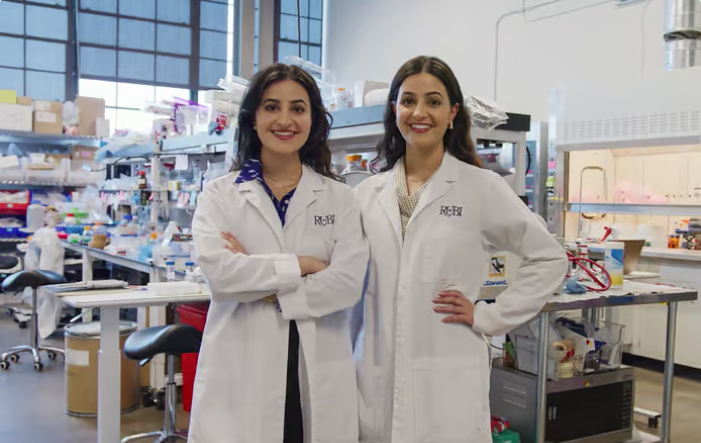Rubi Secures $1 Million Phase II Grant from the National Science Foundation to Scale its Breakthrough Carbon-to-Cellulose Platform
Awarded to less than 5% of applicants, the grant accelerates Rubi's mission to decarbonize materials manufacturing

Rubi, the company re-inventing manufacturing to be symbiotic with the planet, has been awarded a $969,961 Small Business Innovation Research (SBIR) Phase II grant from the National Science Foundation (NSF) to develop and scale its carbon-to-cellulose platform. This prestigious grant, awarded to less than 5% of SBIR applicants over the last decade, recognizes Rubi's groundbreaking advancements in CO2-to-materials technology and will support the company's path to commercialization.
Rubi has pioneered a first-of-its-kind cell-free biocatalysis technology to make CO2-derived materials and chemicals. The company's initial focus is on CO2-derived cellulose to replace traditional wood pulp, aiming to decarbonize textile production by eliminating deforestation and significantly reducing the environmental impact of raw material manufacturing. With proven technology and strong customer partnerships, the nearly $1 million grant accelerates Rubi's mission to meet the urgent global demand for low-carbon materials.
The rare NSF grant will support the commercialization of Rubi's groundbreaking CO2-to-materials technology.
The NSF Phase II award builds on Rubi's successful Phase I grant completion in 2023, which advanced multi-enzyme cascade design and enzyme stabilization for carbon-to-cellulose production. Since then, Rubi's milestones include:
- An $8.7 million seed funding round, co-led by H&M Group and Patagonia.
- Strategic pilot partnerships with global fashion brands H&M, Patagonia, Reformation, GANNI, and Nuuly.
- A series of pilot projects in collaboration with Walmart.
- Debuting the world's first yarn made from CO2 through a fully enzymatic process with Ganni.
- Recognition from Fast Company's World Changing Ideas, TIME's Top Greentech Companies, Business of Fashion 500, Vogue Business 100, and Forbes 30 Under 30 lists.
"This award is a testament to Rubi's vision for a symbiotic manufacturing future and our ambition to lead the next era of sustainable industry," said Neeka Mashouf, Co-Founder and CEO of Rubi. "As we move into 2025, this grant will accelerate our efforts to scale CO2-derived, low-carbon cellulose for the textile industry, ultimately allowing us to transform environmental challenges into opportunities, bridge our proven science with existing supply chains, and set a new standard for decoupling industrial growth from environmental degradation."
"NSF accelerates the translation of emerging technologies into transformative new products and services," said Erwin Gianchandani, NSF Assistant Director for Technology, Innovation and Partnerships. "We take great pride in funding deep-technology startups and small businesses that will shape science and engineering results into meaningful solutions for today and tomorrow."
Rubi's proprietary technology uses a cascade of specialized enzymes to transform simple 1-carbon molecules into complex carbohydrate polymers like cellulose under mild conditions. Compared to traditional methods such as fermentation or chemical catalysis, which are constrained by cost, efficiency, or product range, Rubi's cell-free enzymatic platform can achieve a 10x reduction in capital costs and 3x higher yields than fermentation and significantly lower energy use than chemical catalysis while expanding the range of attainable products.
Unlike cell-based fermentation - which requires energy-intensive conditions to sustain living organisms and typically generates over 70% byproduct waste - Rubi's cell-free biocatalysis process can convert nearly all carbon inputs into the desired product. This maximized efficiency eliminates the significant resource demands of conventional biological methods.
"Rubi's cell-free biocatalysis approach is a paradigm shift in manufacturing, providing a sustainable and efficient solution to produce CO2-derived materials without exploiting natural resources. By producing forest-free cellulose in hours rather than decades and with drastically reduced carbon emissions, water usage, and land impact, Rubi offers a faster, more sustainable alternative to traditional wood pulp," said Dr. Leila Mashouf, M.D., Co-Founder and CTO of Rubi. "We're thrilled to have the continued support of the NSF with this Phase II award and look forward to scaling our technology to meet the growing global demand for ultra-low-carbon, bio-based materials."
About Rubi
Rubi is pioneering the next era of manufacturing with a technology that transforms waste carbon into essential materials. By replacing resource-intensive processes with its innovative carbon-to-materials platform, Rubi is creating a manufacturing system that works in harmony with the planet. Inspired by how trees grow, the company uses biochemical processes powered by enzymes to create planet-positive materials, like textiles, derived from CO2. Rubi was founded in 2021 by two twin sisters, Neeka Mashouf and Dr. Leila Mashouf, who started their scientific research careers at age 15 and have focused on developing technologies that foster human and environmental prosperity over 10+ years. They teamed up in 2021 to re-invent manufacturing with Rubi's proprietary biomanufacturing technology and create a world where human prosperity and industry are planet-positive.
About the U.S. National Science Foundation's Small Business Programs
America's Seed Fund powered by NSF awards more than $200 million annually to startups and small businesses, transforming scientific discovery into products and services with commercial and societal impact. Startups working across almost all areas of science and technology can receive up to $2 million to support research and development, helping de-risk technology for commercial success. America's Seed Fund is congressionally mandated through the Small Business Innovation Research program. The NSF is an independent federal agency with a budget of about $9.5 billion that supports fundamental research and education across all fields of science and engineering.
Source: Rubi Laboratories, press release, 2024-12-05.
